
7 Reasons Why Are Almonds Good for Dogs’ Health
Overview
Almonds can indeed be a beneficial treat for dogs when offered in moderation. They provide essential nutrients like vitamin E and magnesium, which support your furry friend’s immune function and muscle health. However, it’s crucial to approach this with care.
Excessive consumption can pose serious health risks, such as:
- Obesity
- Pancreatitis
- Choking, especially in smaller breeds.
This underscores the importance of moderation and seeking veterinary guidance when considering adding almonds to your dog’s diet. Remember, your pet’s well-being is paramount, and taking these precautions can help ensure a happy, healthy life together.
Introduction
Almonds are often celebrated for their health benefits in humans, yet they present a complex question when it comes to canine nutrition. As a pet owner, you may find yourself grappling with the decision of whether to share these tasty treats with your furry friends. While these nuts are rich in essential nutrients like vitamin E and magnesium, their suitability for dogs is not as straightforward as one might hope. This uncertainty can weigh heavily on your heart, as you strive to provide the best for your beloved companions.
Navigating the delicate balance between offering delicious snacks and ensuring your dog’s safety raises critical concerns. Potential risks such as choking and digestive issues can leave you feeling anxious about your choices. It’s completely understandable to want to treat your pet while also prioritizing their well-being. As the debate continues over whether almonds are truly good for dogs, this article aims to delve into the benefits, precautions, and expert insights that will empower you to make informed decisions about your pets’ diets. Together, we can explore the best options for keeping your furry family members healthy and happy.
Jet Pet Resort: Tailored Pet Care for Dogs Enjoying Almonds
At Jet Pet Resort, we genuinely understand that each dog has unique dietary needs, and we are committed to respecting their preferences and restrictions. Our highly trained staff is not only knowledgeable about various foods but also ready to provide pet owners with compassionate guidance on safe practices. It’s concerning to note that, according to a survey by the Association for Pet Obesity Prevention, 55.8% of canines are overweight or obese. This statistic underscores the importance of addressing personalized dietary needs for our furry friends. We believe in a customized approach, ensuring that every dog’s experience is thoughtfully tailored to enhance their well-being and enjoyment during their stay.
This commitment includes a comprehensive understanding of how specific snacks, such as nuts, and the inquiry of whether almonds are good for dogs, can be safely integrated into their overall diet, promoting their health and happiness. As Integricare beautifully expresses, “Ensuring your dog is happy, healthy, and free of painful conditions are some of the primary goals we have as pet parents.” We warmly encourage pet owners to engage in discussions about their dog’s dietary needs with our staff prior to their stay, as this collaboration is essential in providing the best possible care for your beloved companions.
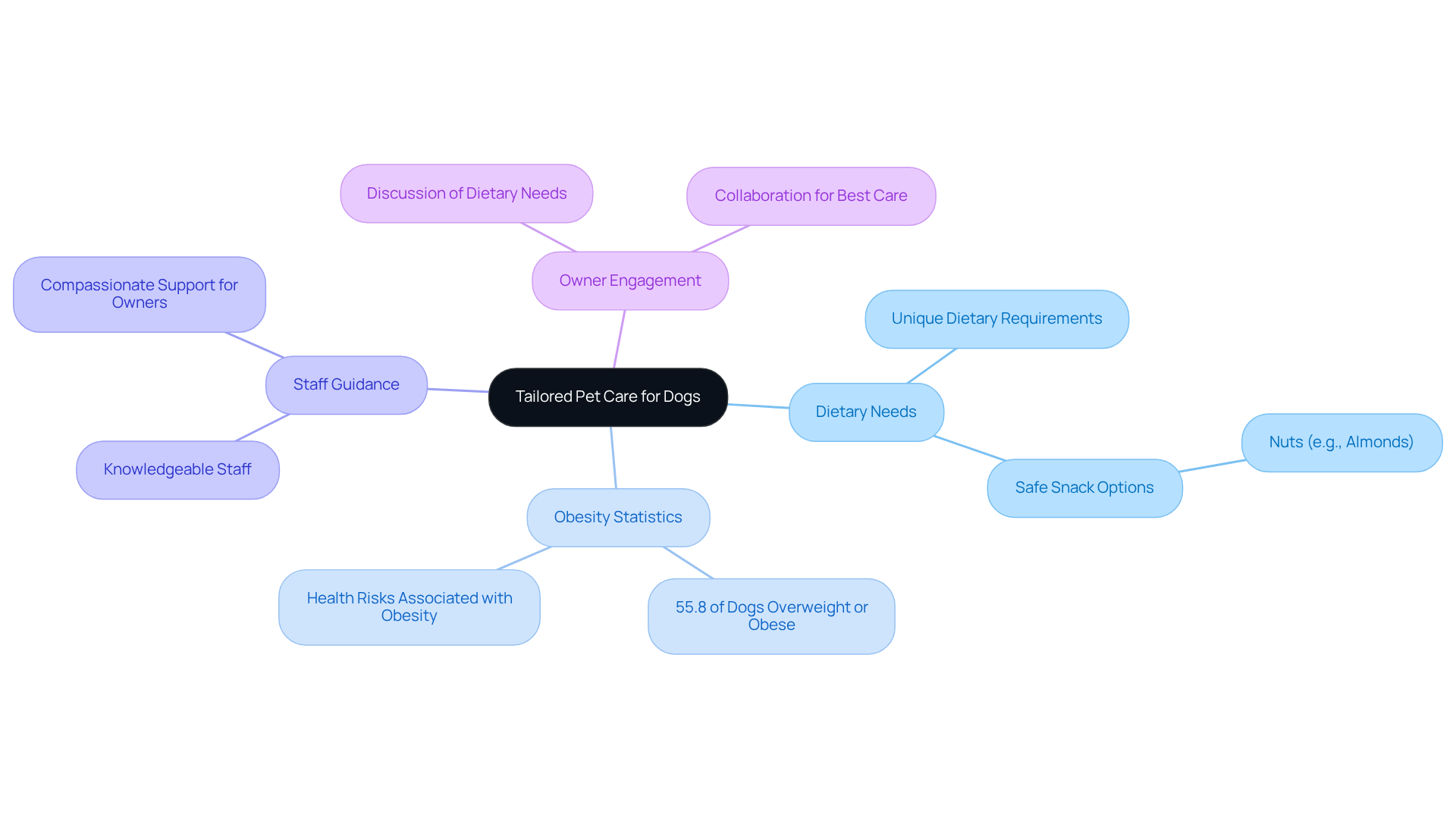
Nutritional Value of Almonds: Essential Nutrients for Dogs
When considering if almonds are good for dogs, it’s important to note that they offer a range of essential nutrients that can benefit our beloved canines, including vitamin E, magnesium, and healthy fats. Vitamin E acts as a powerful antioxidant, helping to boost immune function and promote healthy skin. Magnesium is vital for muscle and nerve function, contributing to your dog’s overall vitality. Additionally, the nutritious oils found in these nuts can serve as a source of energy for our energetic furry friends.
However, as caring pet owners, it’s crucial to understand that while these nutrients are beneficial, they must be thoughtfully integrated into your dog’s overall diet. Consuming too many calories from fatty foods like nuts can lead to weight gain and associated health issues, such as pancreatitis. While the question of whether almonds are good for dogs remains, they can pose significant health risks, particularly for smaller breeds, including gastrointestinal distress and choking hazards. Veterinary experts generally advise that nuts should not become a staple in your dog’s diet. Therefore, moderation is key when considering these nuts as an occasional treat for your beloved pets.
It’s also important to keep a watchful eye on your pets for any signs of distress after they consume nuts, as allergic reactions can occur. If you notice any concerning symptoms, seeking prompt veterinary care is essential. Remember, your pet’s well-being is our top priority, and being attentive to their needs is a loving way to ensure they stay healthy and happy.
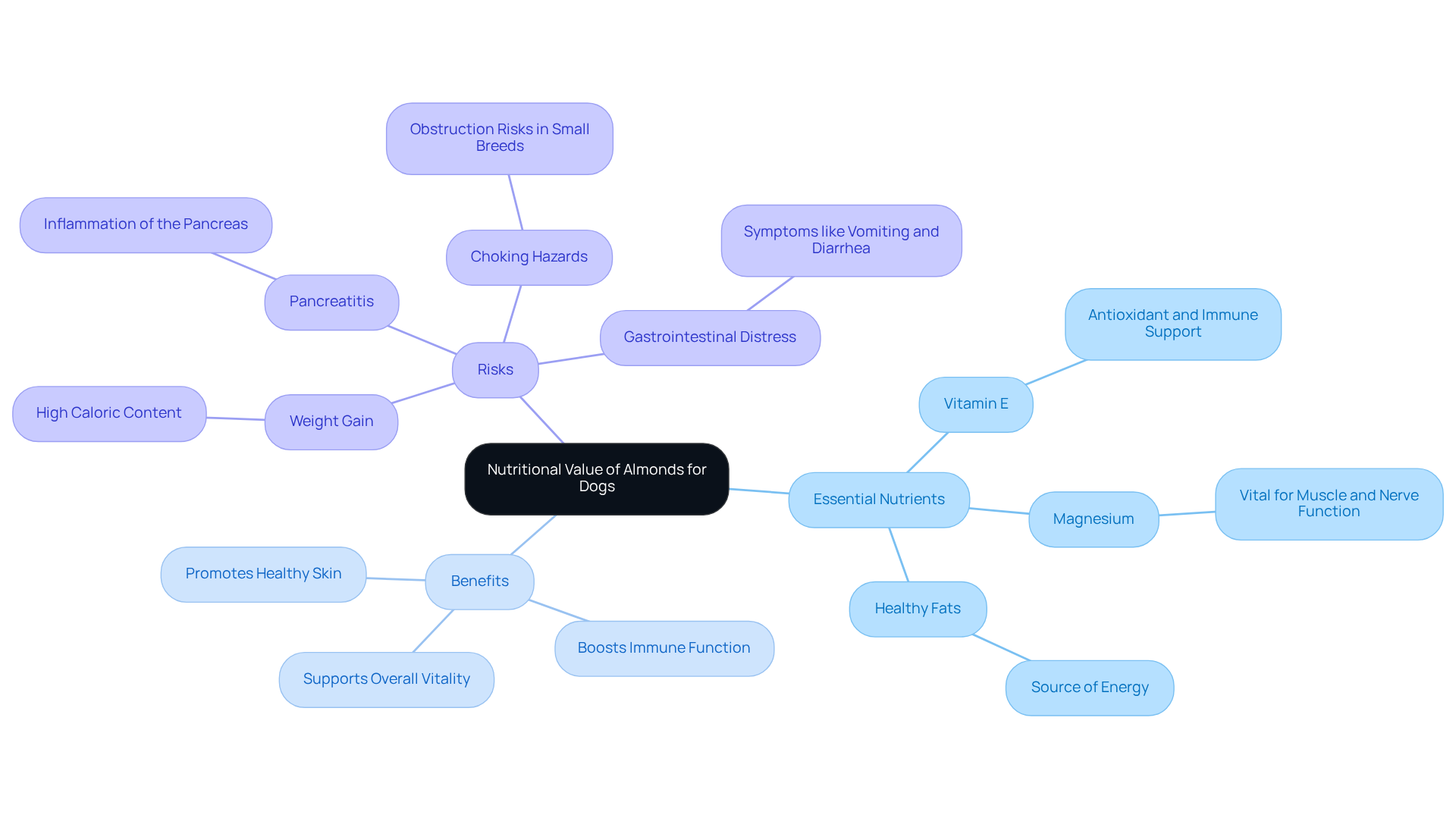
Health Benefits of Almonds: Supporting Canine Wellness
When included in a dog’s diet in moderation, nuts can indeed offer various advantages that many pet owners cherish, but it is essential to consider if almonds are good for dogs. These little powerhouses are packed with antioxidants, which may assist in lowering inflammation and promoting cardiovascular wellness—essential components for sustaining overall vitality in our beloved dogs, leading to the question: are almonds good for dogs? The nutritious oils present in nuts raise the question of whether almonds are good for dogs, as they not only aid in achieving a glossy fur but also support skin well-being, enhancing our pets’ looks and comfort.
Veterinarians emphasize that antioxidants are crucial for dogs, and a common question is whether almonds are good for dogs, as they can help counter oxidative stress and enhance immune function. In fact, it’s heartening to know that studies suggest approximately 70% of dog owners report noticeable improvements in their pets’ health after incorporating nuts into their diets. However, it’s vital to practice careful portion control, as excessive nut consumption raises the question of whether almonds are good for dogs and can lead to digestive issues.
Ensuring that nuts complement a balanced diet rather than replace nutritionally complete foods is key to maximizing their benefits for canine wellness, especially when asking if almonds are good for dogs. Consulting a veterinarian before making dietary changes is always advisable, ensuring that our furry friends’ nutritional needs are met with the utmost care.
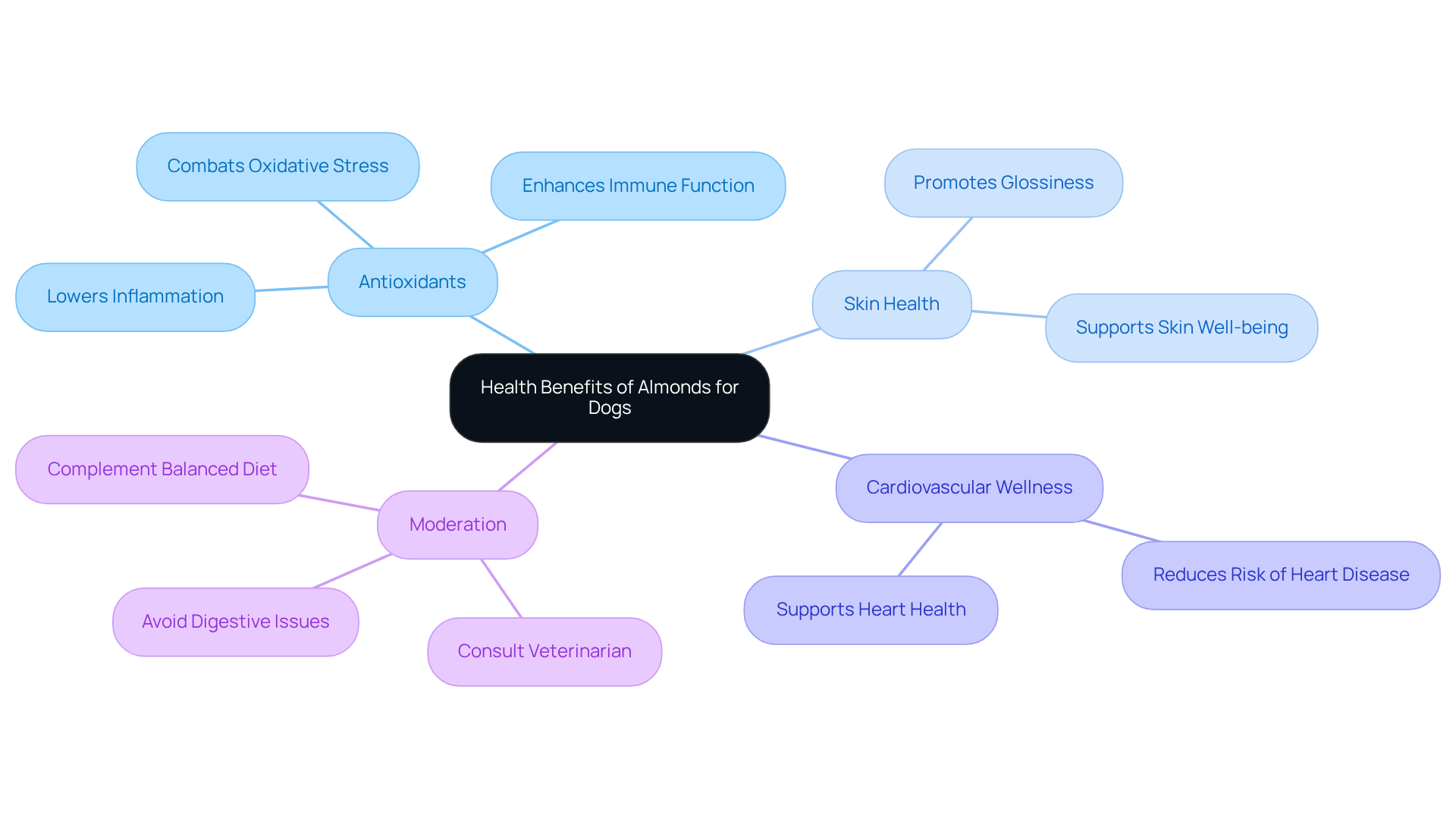
Precautions for Feeding Almonds: Avoiding Potential Risks
As a loving pet guardian, it’s important to understand that while these nuts are not inherently harmful to our canine companions, they do pose significant risks that we should carefully consider. For our smaller dog breeds, the danger of choking is a real concern, as they may struggle to chew these nuts properly. Additionally, nuts can be difficult for dogs to digest, often leading to gastrointestinal upset, which may manifest as vomiting, diarrhea, or discomfort. These distressing symptoms can appear shortly after ingestion, underscoring the need for vigilant monitoring of our furry friends.
The high-fat content in these nuts also raises alarms, as it can lead to pancreatitis, a serious condition that inflames the pancreas and can be quite painful for our pets. To help mitigate these risks, it’s essential to:
- Keep a close eye on your dog when offering nuts.
- Consult with a veterinarian before introducing any new foods into their diet.
Remember, there are safer alternatives available, such as dog-friendly treats, which can promote your pet’s health and happiness. Your devotion to their well-being is what truly matters, and making informed choices will ensure they thrive.
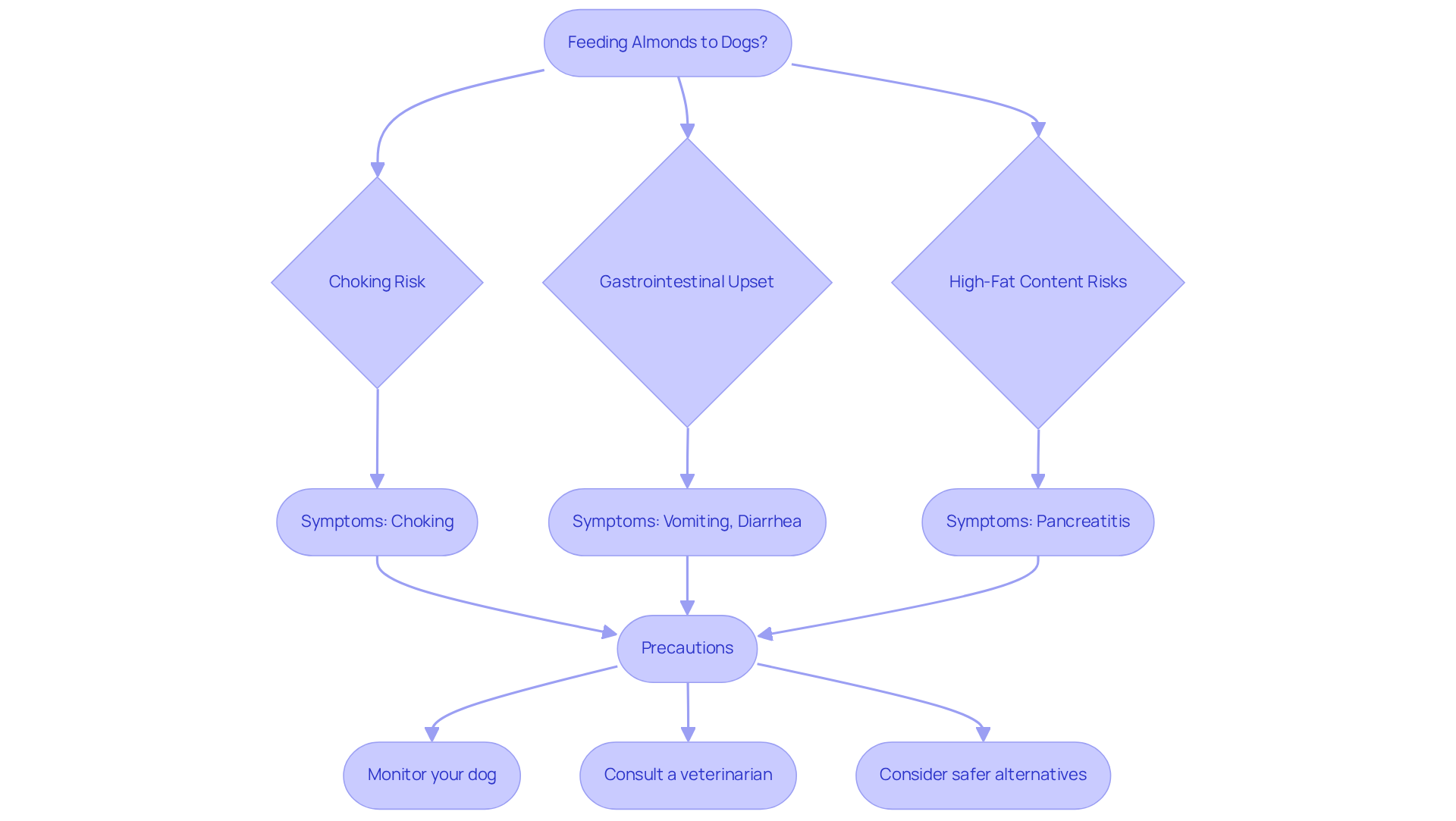
Recognizing Almond Toxicity: Symptoms to Watch For
While these nuts are not inherently harmful to our beloved canines, they can lead to a range of negative reactions that may cause concern for pet owners. Common symptoms such as vomiting, diarrhea, lethargy, and signs of abdominal pain can arise, leaving you worried about your furry friend. Research indicates that gastrointestinal distress can occur in dogs after ingesting nuts, particularly due to their high-fat content, which may lead to pancreatitis. It’s important to recognize that foods rich in fat, like nuts, can upset a dog’s stomach and potentially result in inflammation of the pancreas if consumed in large amounts.
Moreover, these nuts pose a choking risk and can lead to intestinal blockage, especially in smaller dog breeds. It’s essential for pet owners to keep a close eye on their dogs after they consume almonds, particularly to understand if almonds are good for dogs. If your dog displays any of the symptoms mentioned, reaching out to a veterinarian is crucial for guidance and possible treatment. In cases where a large quantity of nuts has been consumed, seeking prompt veterinary assistance can help prevent serious medical issues.
Veterinary responses to nut consumption typically involve assessing the dog’s condition and providing supportive care. For instance, if your dog is experiencing vomiting or diarrhea, the veterinarian may suggest dietary adjustments or medications to help alleviate these symptoms. Recognizing these adverse reactions early can make a significant difference in the outcome, ensuring the health and safety of your cherished pet. For emergencies, remember that the ASPCA Animal Poison Control Center (APCC) is available 24/7 to offer advice and assistance.
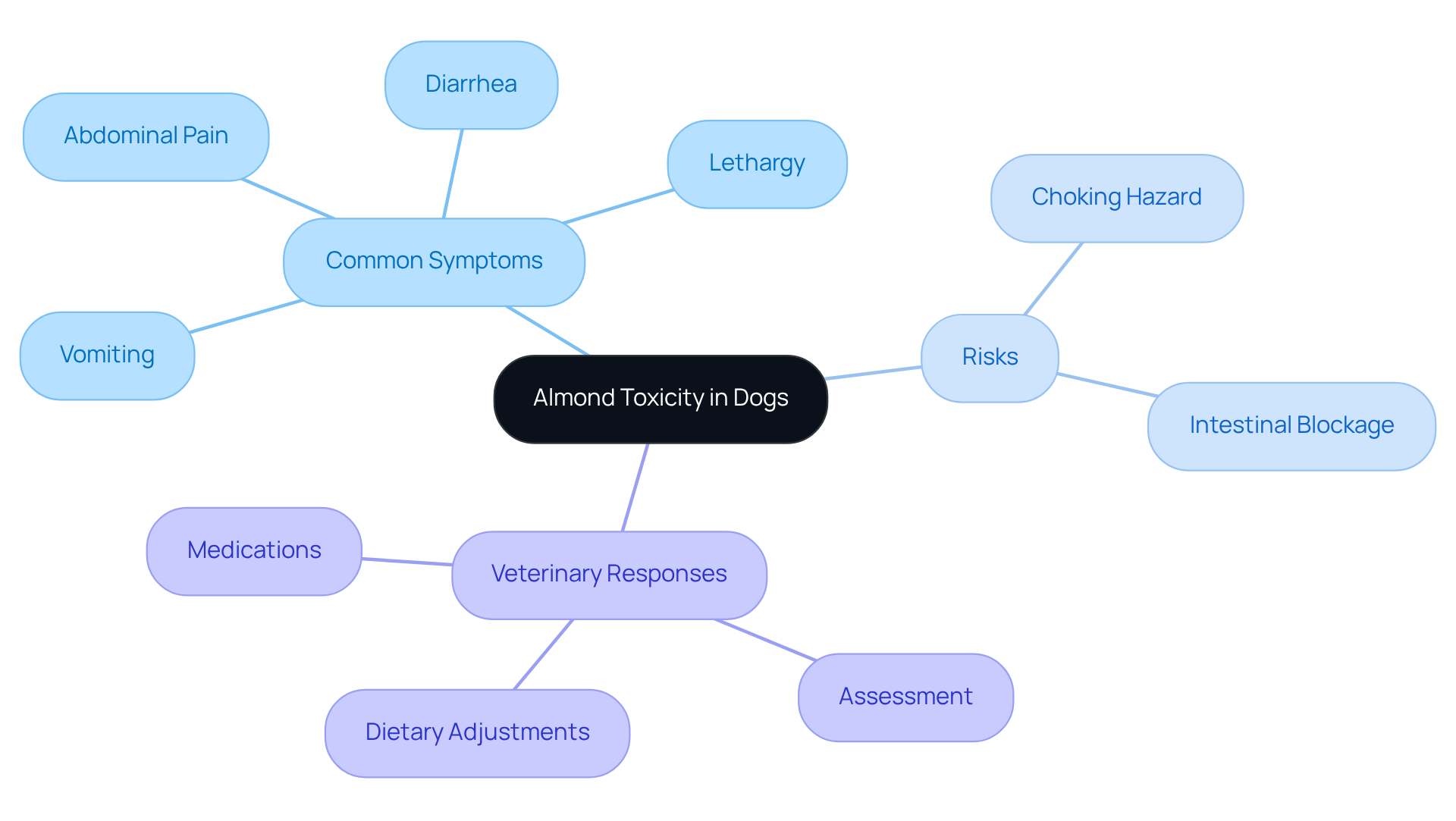
Introducing Almonds Safely: Tips for Pet Owners
When considering the question of whether almonds are good for dogs, it’s important to approach the inclusion of nuts in your dog’s diet with care and caution. Begin by offering just a small amount—perhaps one nut—and take the time to observe your dog’s reaction over the next 24 hours. Remember, the nuts should be plain, unsalted, and completely free from any seasonings.
During mealtime, keep a watchful eye on your furry friend to prevent choking, as whole nuts can pose a serious risk of life-threatening blockages, especially in smaller breeds. Additionally, it’s worth noting that these nuts are high in fats and could potentially lead to pancreatitis in some dogs, which raises the question of whether almonds are good for dogs; moderation is key—consider them as an occasional treat rather than a staple.
If you notice any signs of discomfort or adverse reactions, please consult your veterinarian without delay. This gradual approach not only aids in identifying any possible allergies but also aligns with the thoughtful recommendations from veterinary professionals for safely introducing new foods into your dog’s diet.
Lastly, it’s essential to mention that nut milk is not advisable for dogs, as it may cause digestive discomfort. Your pet’s health and happiness are paramount, and taking these careful steps can help ensure their well-being.
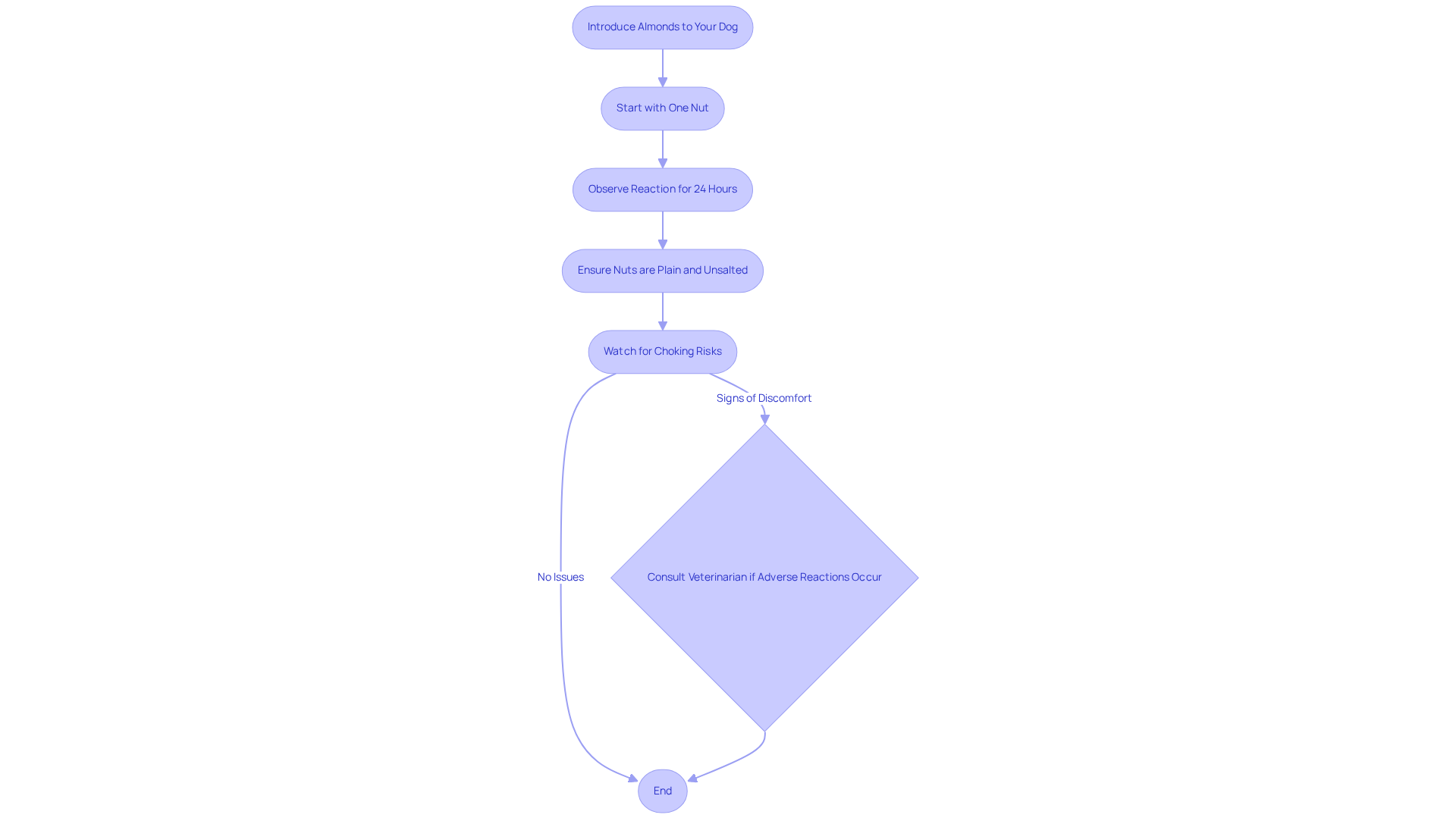
Safe Nut Alternatives: Treat Options for Dogs
For pet owners who are concerned about finding safe nut alternatives for their beloved pets, there are several options to consider. Peanut butter, as long as it contains no xylitol, along with cashews, sunflower seed butter, and Brazil nuts, can be excellent choices. These alternatives not only offer comparable nutritional benefits but also help minimize the risks associated with almonds, leading to concerns about whether almonds are good for dogs. When free from harmful additives, peanut butter can be a delightful treat for dogs, providing healthy fats and protein that contribute to their happiness and vitality.
Cashews, when enjoyed in moderation, provide vital nutrients such as magnesium and antioxidants, which can aid in your pet’s overall well-being. Similarly, sunflower seed butter is another nutritious option, rich in essential vitamins and minerals that support a healthy lifestyle. However, it’s important to remember that excessive nut consumption can lead to health issues like pancreatitis. Therefore, always introduce any nut butter gradually, keeping a close eye on your furry friend for any adverse reactions. It’s essential to ensure that treats remain a small part of your dog’s diet.
As Dr. Amanda Ardente, a compassionate veterinarian, wisely notes, “Dogs should only eat nuts in small quantities because they are high in fat and calories.” Additionally, be mindful of potential choking hazards, especially with nuts like cashews, which can pose dangers if not handled properly. By being attentive and informed, you can make the best choices for your pet’s health and happiness.
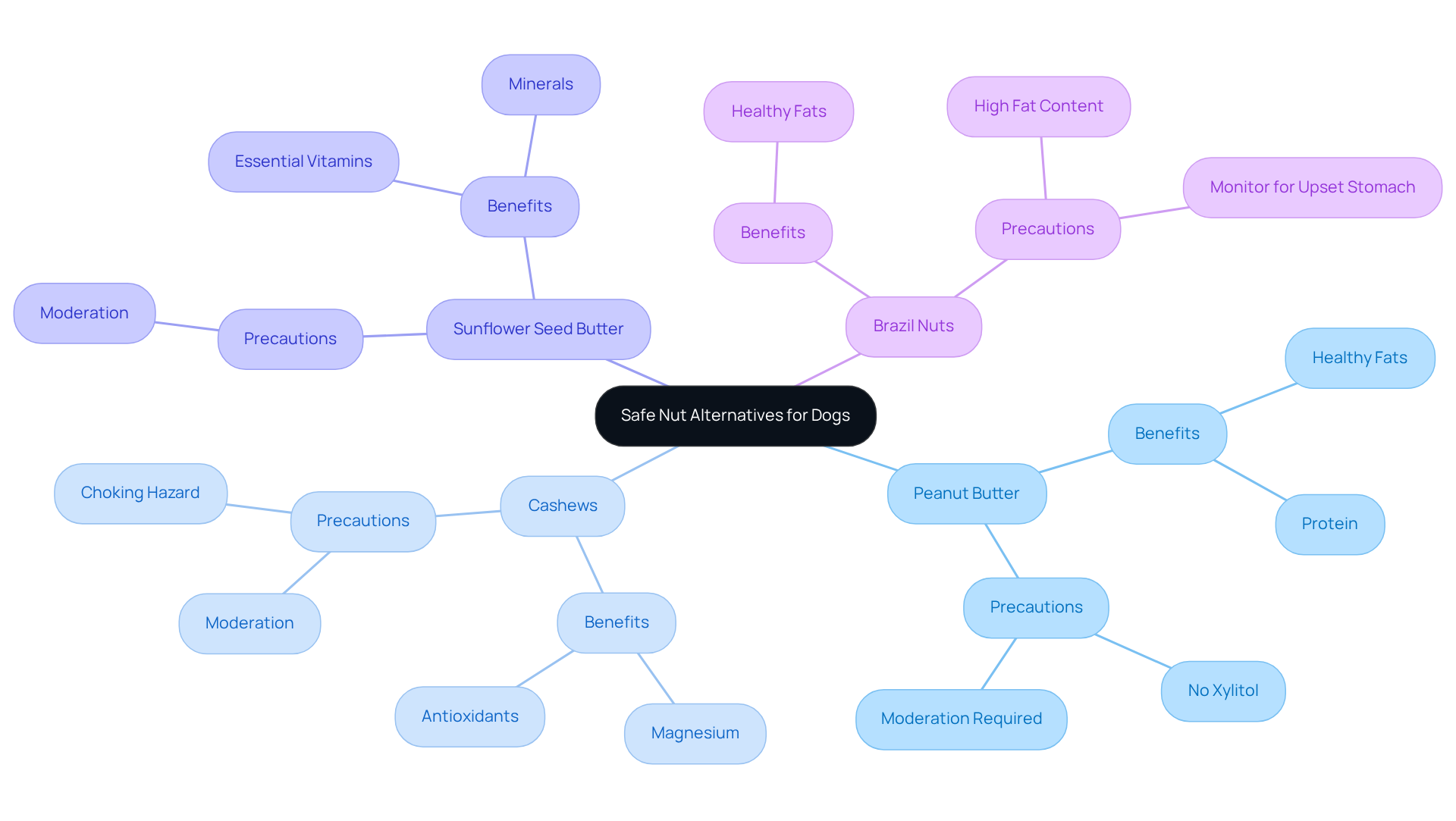
Moderation Matters: How Much Almonds Can Dogs Have?
Providing nuts to our beloved canines requires careful moderation, and it’s understandable to be concerned about their health. For larger dogs, a general guideline is to limit almond treats to just one or two almonds, especially when considering if almonds are good for dogs. However, it’s best for smaller breeds to avoid them altogether due to the choking hazard that raw almonds can pose, leading to concerns about whether almonds are good for dogs.
It’s crucial to consider your dog’s overall diet and caloric intake, ensuring that treats do not exceed 10% of their daily caloric needs. Many pet owners, out of love and care, may unknowingly exceed this limit. Studies show that a significant percentage of pet owners are unaware of the caloric contributions of treats, which can lead to health issues like obesity or pancreatitis.
This is why educating pet owners about these limits is so essential; facilities often provide valuable resources to help maintain a balanced diet for pets, including guidance on checking treat packaging for calorie information. Consulting with a veterinarian can further clarify how to safely incorporate snacks like nuts into your dog’s diet, emphasizing the importance of moderation and dietary balance.
Additionally, it’s wise for pet owners to be cautious with flavored or salted nuts, as these can lead to dehydration and other medical problems. Together, we can ensure our furry friends lead healthy, happy lives.
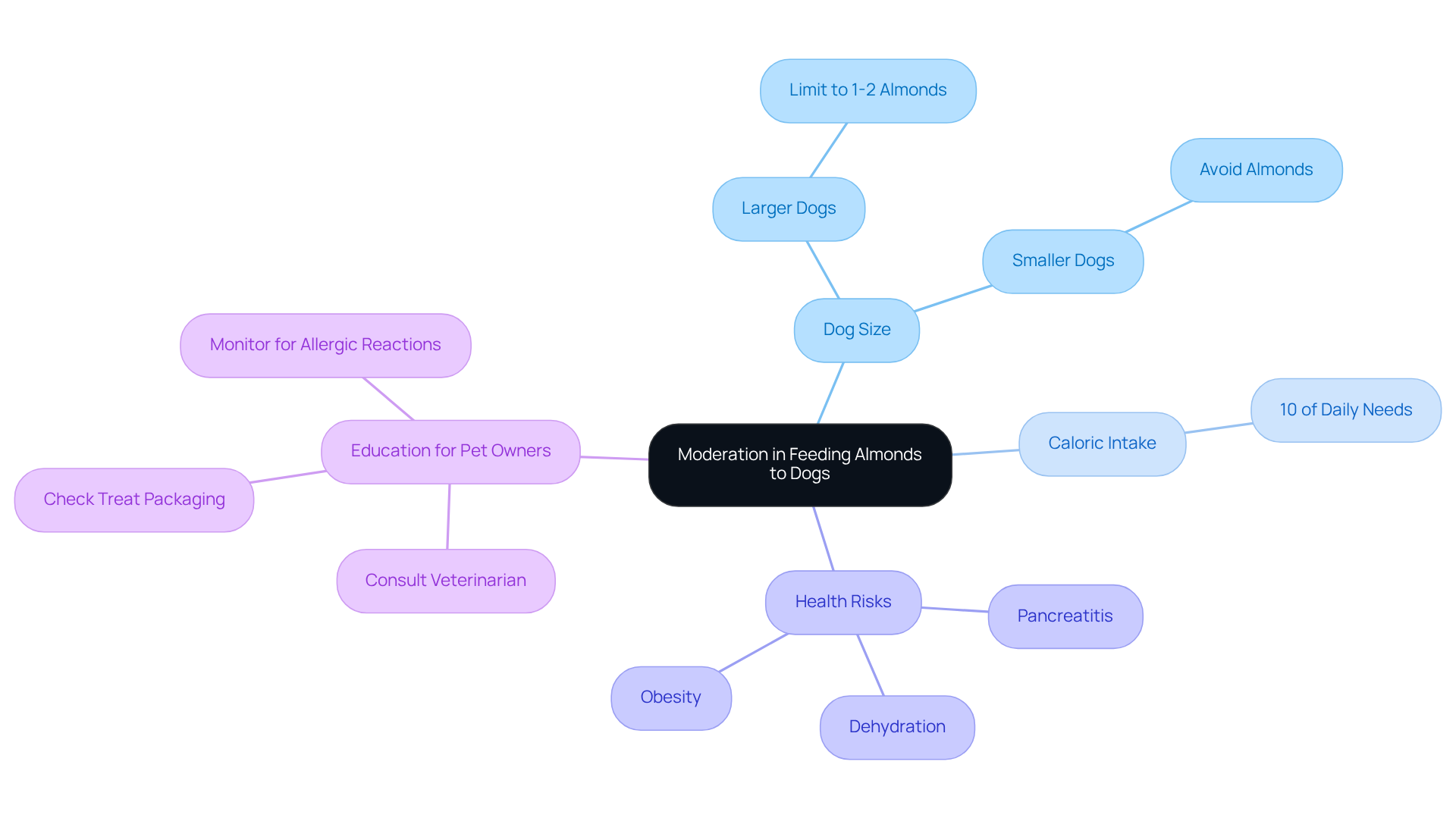
Professional Guidance: How Jet Pet Resort Supports Pet Nutrition
At Jet Animal Resort, we understand that adequate nutrition is vital for the wellness and well-being of your beloved pets. Our dedicated team, including pet care specialists, is here to support you in navigating your pet’s dietary needs, ensuring that every animal receives personalized nutritional guidance.
With many pet owners—over 43%—turning to veterinary teams for expert advice on nutrition, our commitment to educating clients about healthy snack alternatives, like nuts, is more important than ever.
As one caring veterinarian expressed, ‘Nutrition plays a crucial role in the overall condition and well-being of pets everywhere.’ This insight reinforces our promise to provide the highest level of care, tailored to each pet’s unique requirements, while empowering you to make informed decisions about their diets.
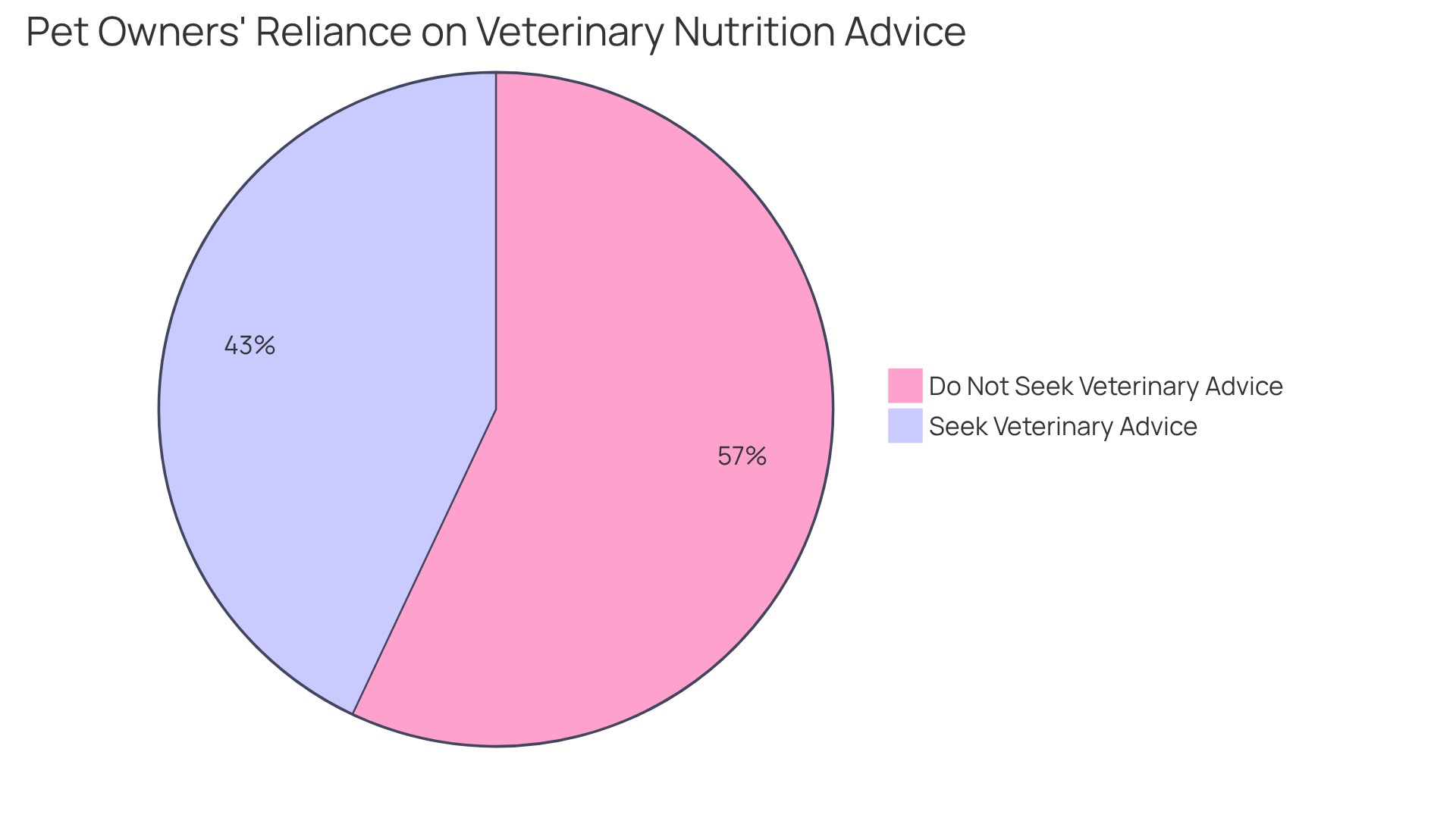
Consult Your Veterinarian: Ensuring a Balanced Diet for Your Dog
Consulting your veterinarian before introducing any new food, including almonds, is crucial for your dog’s well-being, especially to determine if almonds are good for dogs. We understand how much you care about your furry friend, and your veterinarian can offer personalized advice tailored to your dog’s unique health status, dietary requirements, and any pre-existing conditions.
Regular veterinary check-ups are not just about maintaining a balanced diet; they play a vital role in supporting your dog’s overall well-being. In fact, studies reveal that pet owners who actively engage with their veterinarians about nutrition are more likely to find success in managing their dogs’ diets. A recent survey of 7,539 participants showed that those who regularly consult with their veterinarians about their dog’s nutrition express greater satisfaction with their pet’s dietary management.
This proactive approach ensures that any new foods introduced align with your dog’s nutritional needs, fostering a healthier lifestyle. To maximize the benefits of these consultations, consider keeping a food diary for your pet to discuss during your visits. This simple step can make a world of difference in understanding and catering to your beloved companion’s dietary needs.
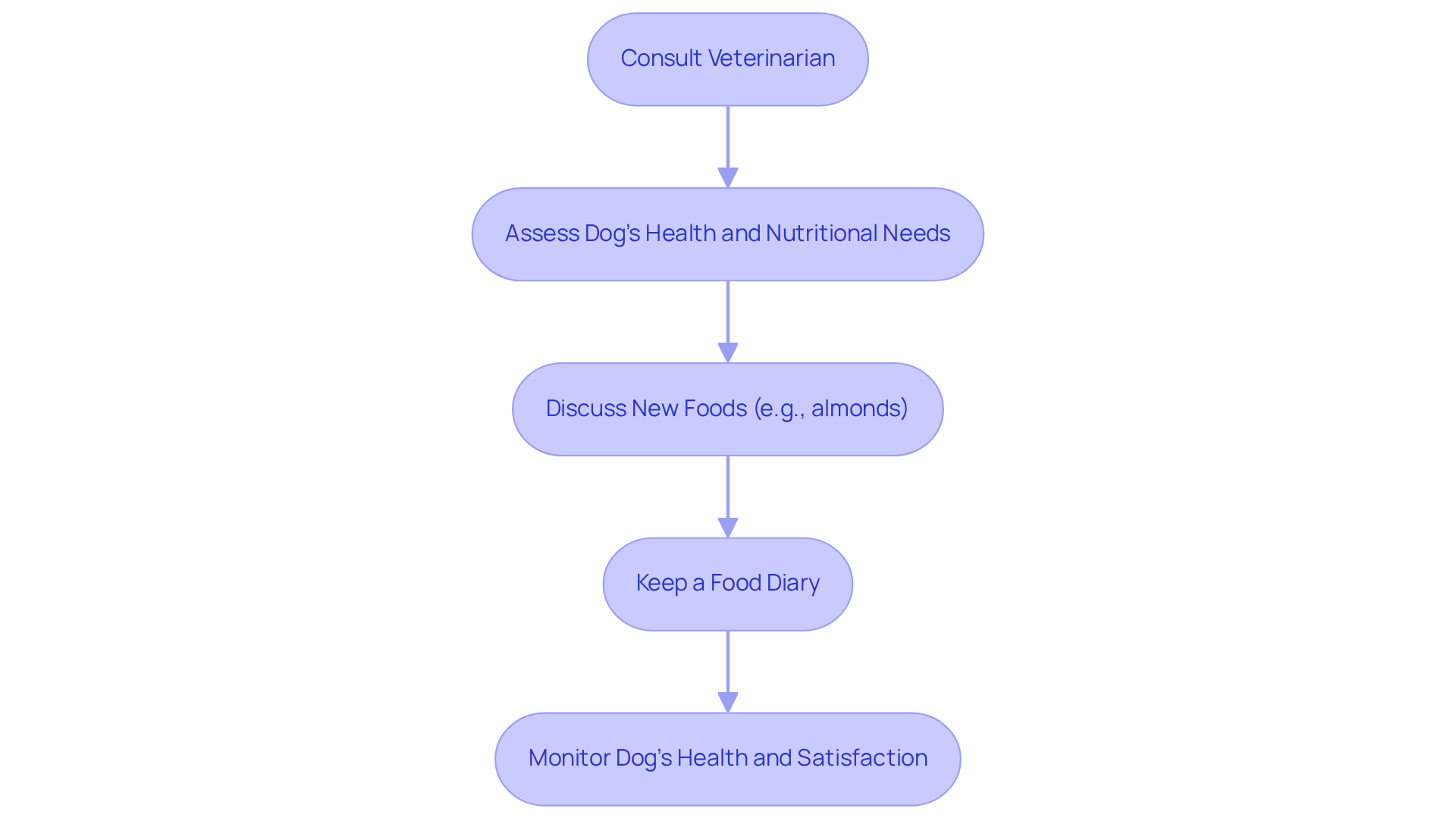
Conclusion
Incorporating almonds into a dog’s diet requires careful consideration, as these nuts can provide nutritional benefits while also posing potential risks. We understand that as pet owners, you want the best for your furry companions. Almonds are rich in essential nutrients like vitamin E and magnesium, which can support a dog’s immune function and overall vitality; however, moderation is crucial.
It’s important to recognize that excessive consumption can lead to health issues, including pancreatitis and gastrointestinal distress, particularly in smaller breeds.
We encourage you to monitor your dog’s reaction to almonds and consult with a veterinarian before introducing any new foods. Being aware of symptoms of almond toxicity and understanding the risks associated with feeding nuts to dogs is vital. You might also explore safe alternatives such as peanut butter and sunflower seed butter. By prioritizing a balanced diet and being vigilant about portion control, you can help ensure your beloved pets enjoy the benefits of almonds without compromising their health.
Ultimately, the well-being of dogs hinges on informed dietary choices. Engaging with veterinary professionals for personalized advice and maintaining open communication about your pet’s dietary needs will empower you to make the best decisions for your companions. With a thoughtful approach to nutrition, your dogs can thrive and lead healthy, happy lives.
